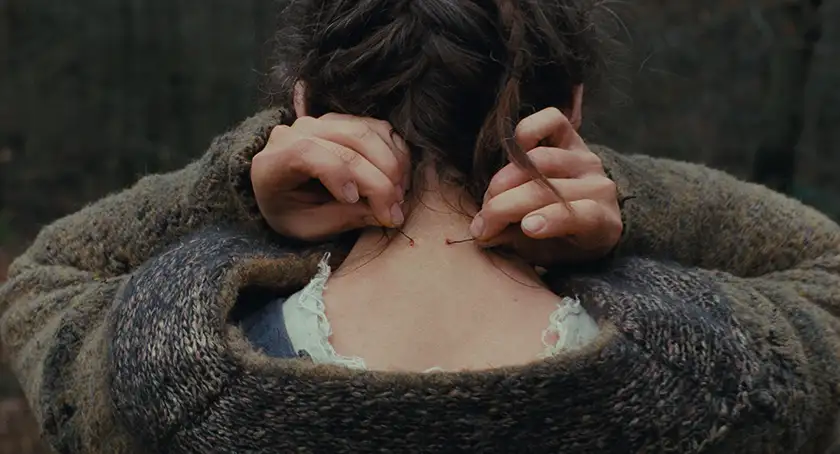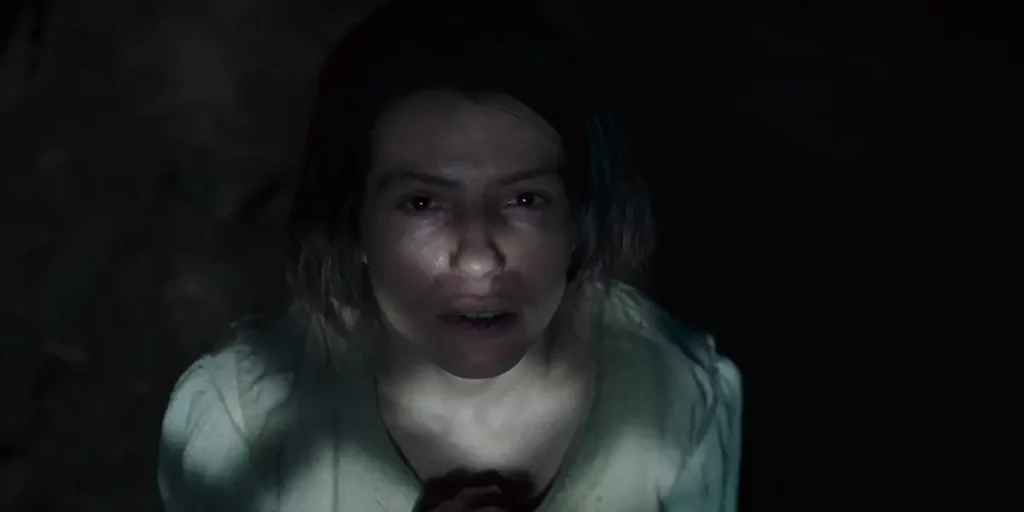The Devil’s Bath paints a dark image of religion as the savior and downfall of an oppressed woman, desperately in search of agency in a time when women had none.
The creative minds behind the masterful psychological horror Goodnight Mommy (2014), Veronika Franz and Severin Fiala, are back with another glimpse into their thrilling artistry through the folk horror that is The Devil’s Bath (Des Teufels Bad).
A highly religious village community, living in the Austrian woods in the middle of the 18th century, is celebrating the wedding day of Agnes (Anja Plaschg) and Wolf (David Scheid). On their very first night as a married couple, something already feels off. The spouses gradually grow estranged from one another, diminishing their relationship to its pragmatic, emotionless responsibilities. Imprisoned by the expectations on her shoulders and deprived of the one and only thing she longs for, Agnes turns to any means in her hopelessly limited reach to find her savior, resulting in a grim fable about oppression, violence, and doctrinal taboos.
Based on unsettling historical records, The Devil’s Bath retains certain horror elements in its storytelling but largely remains in the territory of a religious slow-burn thriller. The question is, does it ever burn at all?
From its first to its last frame, the film is encapsulated in a bleak melancholy that never eases up but seeps into every minute of its rather lengthy runtime. This poses the apparent challenge of trying to sustain tension through a narrative that doesn’t offer much variation in its dynamics. Franz and Fiala’s choice to maintain this particular tone could be viewed as a representation of the melancholy within the character’s crumbling inner world, but the end result is a thinning accumulation of tension that lurks for too long until it dissipates. The eerie symbolic imagery is not effective enough to counterbalance a creative decision that’s so difficult to carry out.

Agnes is a character deprived of any agency whatsoever due to the religious and familial beliefs passed on to her since birth. The historical context of the film guides us towards understanding where Agnes’ helplessness stems from: she abides by the dogmas of her community, signalling her place in the household. Agnes isn’t asked a single question throughout the entire film. So, when Wolf refuses to meet his responsibilities as a husband and grant Agnes what she yearns for, she grows reluctant to meet hers as a wife. Instead, she falls progressively more ill, and her mental state deteriorates until the only way to emancipation appears through the most horrific of sins.
With that being said, the execution of the kind of build-up The Devil’s Bath relies on isn’t as promising as it sounds on paper. The film never displays any of the required sensitivity to horror genre conventions in order to be able to subvert them as it so badly wants to.
As we see only through Agnes’ viewpoint, many of the questions about Wolf’s character are left mysteriously unattended, despite the heavy insinuations that his romantic interests might have always lied elsewhere. Depending on how much those subtleties are considered, the film is left to be interpreted in various ways, but it’s almost impossible not to cling on to them as they remain the only thing able to justify Agnes’ descent into madness.
From then on, The Devil’s Bath becomes a story about how women were blamed and accused of insanity because of men’s misdeeds. The woman receives the punishment for the consequences of the man’s actions, or, in this case, inactions.
The saving grace of the film is Anja Plaschg’s anchoring but devastating performance that only becomes stronger with every next beat, culminating in a spine-chilling confession scene near the closing of her character’s arc. Not only that, but she composed the exceptionally eerie score under her music pseudonym Soap&Skin, which makes her the main contributor to the two defining elements of the religious thriller.
It’s not just a matter of “getting it.” Yes, The Devil’s Bath is clear in its intention to not discredit the historical context of Agnes’ tragic arc and the suffering of all the women that have paved the path for her, but the issues of the film lie in its incompleteness as a medium and its weakness as a conductor. Instead of succeeding in its attempts to convey a strong narrative about religious oppression, it ends up boring the viewer by emptily roaming around its potential for too long.
The Devil’s Bath premiered at the 2024 Berlin Film Festival and will be released on Shudder on June 28, 2024. Read our reviews of other recently released religious horror movies: Thine Ears Shall Bleed, Deliver Us, The Exorcism (2024), The Exorcist: Believer, The Last Rite, The Pope’s Exorcist, Prey for the Devil, and Skeletons in the Closet!

